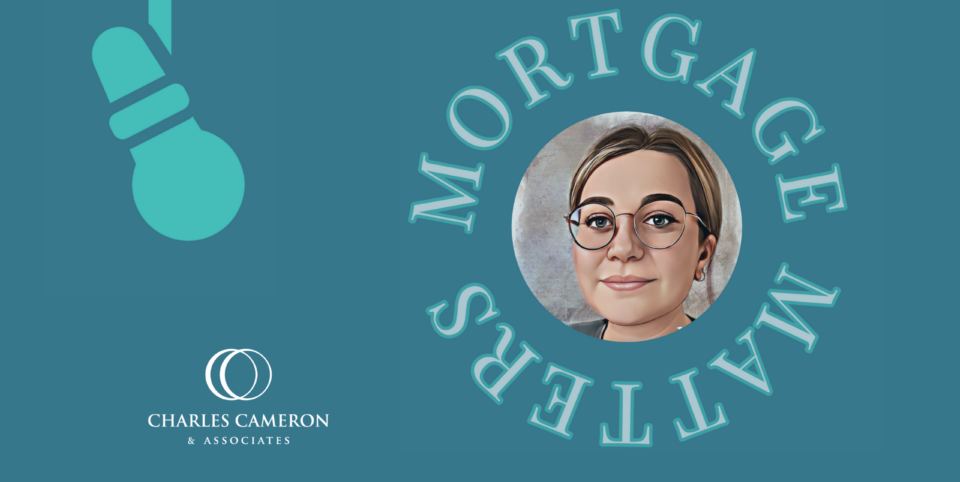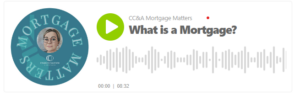Contact
020 4515 6728
info@ccameron.co.uk
Charles Cameron & Associates
Blackfriars Foundry
154-156 Blackfriars Road
London SE1 8EN
What is a mortgage?
June 16, 2022
Information published was correct at the time of writing
--

In this episode, we discuss the basics of a Mortgage Loan. Such as, What is a mortgage? Who provides mortgages? What types of mortgages are available? How long does it take to pay off a mortgage?

What is a mortgage
Hello and welcome to this podcast brought to you by Charles Cameron and Associates.
Today we will be discussing the basics of a Mortgage Loan. Such as, What is a mortgage? Who provides mortgages? What types of mortgage are available? How long does it take to pay off a mortgage?
So… What is a mortgage? A mortgage is a legal agreement between you and a loan provider to borrow money to purchase a property or raise money against the value of a property you already own. The mortgage provider lends money to the debtor in exchange for taking a legal charge on the property they are financing. This means that during the time you have a mortgage, you have a responsibility to service this finance and the lender can repossess your property should you fail to do this. The Lender will charge interest on the debt so you will be paying back more than the original loan amount.
Now, let’s look at the different types of mortgage lenders operating in the UK. There are 2 main types of mortgage providers in the market – High Street Lenders and Niche Lenders. Most high street lenders are there to help with straightforward lending for residential purchases and refinancing as well as standard Buy To Let purchases and refinancing. These lenders can, on the whole, be used for most circumstances and all have different criteria, which one of our advisers can navigate to find the lender that is right for you.
If the mortgage lending required is a little more complex, a niche lender can be approached to assist with a mortgage. This could be due to a much larger than average loan size required, insufficient credit scoring or any previous payment defaults or county court judgements against the borrower, as well as commercial and bridging lending or even second charges.
Lending obtained from niche lenders is usually more expensive than high street lending for both interest rate and also any associated fees.
So what types of mortgages can I get from the high street?
Residential lending covers mortgages intended for ‘owner occupier’ use. This means that you will be living in the property. When you buy a property, the range of products available to you will be available to either a first-time buyer or a home mover. Once you take out a mortgage, it is unlikely that you will have the same mortgage product for the entirety of your mortgage term. Lots of rates come with end dates, meaning that once your mortgage rate is coming to an end you will need to choose a new rate available on the market for your mortgage to move onto. If you decide to stay with your existing lender and take a new rate, this is called a ‘Product Transfer’. Should you be eligible for and apply for a better rate with a different lender, this process is called ‘remortgaging’ or ‘refinancing’. The types of products available on the market at this time will be for ‘existing mortgage holders’.
Along with ‘product end dates’, products may also have ‘early redemption charges’ or ‘ERCs’. If this is the case, that means that if you move your mortgage to another lender during your initial tie-in period, you will incur these penalties/. If, however, you wish to borrow more money against your property and you are unable to remortgage because of your ERCs, you may be able to request more lending from your current provider via a further advance.
There are also mortgages available for investment properties, such as a Buy To Let mortgage. This is a mortgage is designed to provide the money needed to purchase a property that you intend to rent to a tenant. There are a wide range of lenders willing to lend to landlords and there should be a plenty of product ranges available.
Lastly, there are also retirement mortgages on the market, such as a ‘RIO’ – which is a ‘Retirement Interest Only’ mortgage, and Equity Release mortgages. These are targeted at people who are looking to achieve later life lending on their property.
So the first step to understand the most suitable mortgage for you is to identify what buyer category you fall under, you will then know what mortgage products you are eligible for.
The next step is to think about the type of interest rate best suits your circumstances and ambitions. There are many different types of interest rate and how this is applied to the capital you can borrow.
A fixed-rate mortgage is there for people who are maybe more risk adverse or just want certainty when budgeting. It’s very much like it sounds – a fixed interest rate that does not vary month on month, so has a set repayment amount for the initial rate term. The initial period that this is fixed for can be as long or as short as you need. Most lenders offer this for 2, 3 or 5 years but there are lenders who offer these for 7 or even 10 years. For example, if you took out a mortgage with a lender with a fixed rate of 2.12% for 5 years and after 2 years into your mortgage the bank of England base rate increased, despite the likelihood of an initial rate of any new 5 year fixed mortgage increasing, your payments would not be affected, until the end of your deal in a further 3 years. So, your mortgage will not change to match market conditions. However, it’s worth remembering that this would also be true if interest rates were to go down, you would still be paying your rate even if the rates on the market are now cheaper.
Aside from fixed rate mortgages, there are also tracker or variable rate mortgages. These rates can change with the open market. If for example you had a mortgage that tracked at 1.5% above the Bank of England base rate, as of the 2nd February 2022, the rate applied to your mortgage would be 1.75%. However, the next day (3rd of February 2022), the Bank of England base rate was increased to 0.5%, meaning that the new rate applied to your tracker mortgage would become 2% APR.
There is therefore a risk that your mortgage repayments may increase. However, as we saw on 19th March 2020, the bank of England base rate dropped to 0.1%, an all-time low, so at that time, many tracker mortgage holders benefitted from their mortgage repayments reducing in line with this.
With a fixed or tracker rate mortgage, you can be locked into that unchanging rate for the initial period of the mortgage. It is worth noting, that lenders will charge you an ERC – Early Redemption Charge, if you need or decide to end your deal earlier than the length of the product agreement. At the end of the tie-in period, your mortgage would be subject to the lenders Standard Variable Rate, which is often higher than their fixed rate product offers, so it would be likely at that time that your repayments would go up (sometime significantly). SVR is like a ‘standard tarriff’ offered on utility bills and will likely be much higher than what you would be paying if you had selected a new rate. That is why we will ensure a mortgage review is carried out in plenty of time to ensure a new product is lined up from day 1 of your existing mortgage ending. This could be with your current lender via ‘product transfer’ or a new mortgage with a new provider on a remortgage rate, depending on the most suitable mortgage that your adviser can find in the market for you.
Lastly, lets discuss how the overall mortgage term affects your mortgage.
People often think a ‘standard’ mortgage term is 25 years, however the term that is most suitable for you will be based on many factors, such as your age and your affordability when the cost of living and monthly commitments are taken into consideration.
The longer you have your mortgage over, the more interest you will pay, but you can overpay on your mortgage in order to either reduce your monthly repayments or reduce the mortgage term, as you would then be paying it off faster. There is usually a limit to how much you can overpay on your mortgage each year, before incurring any early redemption penalties, so if you do decide to make overpayments, please make sure you know the amount your lender allows beforehand. In the early years of your mortgage, your monthly repayments will consist of mainly interest as you have a larger balance outstanding on the mortgage. However, in the later years, less interest is charged because you owe less, so you will be paying down mostly capital with your repayments.
Remember, no matter what type or term of mortgage that you apply for, you should always get independent and professional advice from a fully qualified mortgage adviser to understand and explore all available options. Our team of friendly brokers are waiting to support you!
Listen to our Mortgage Matters podcast series here.
Don’t forget, our professional friendly advisers are on hand to support you and can help you explore all of your options.



